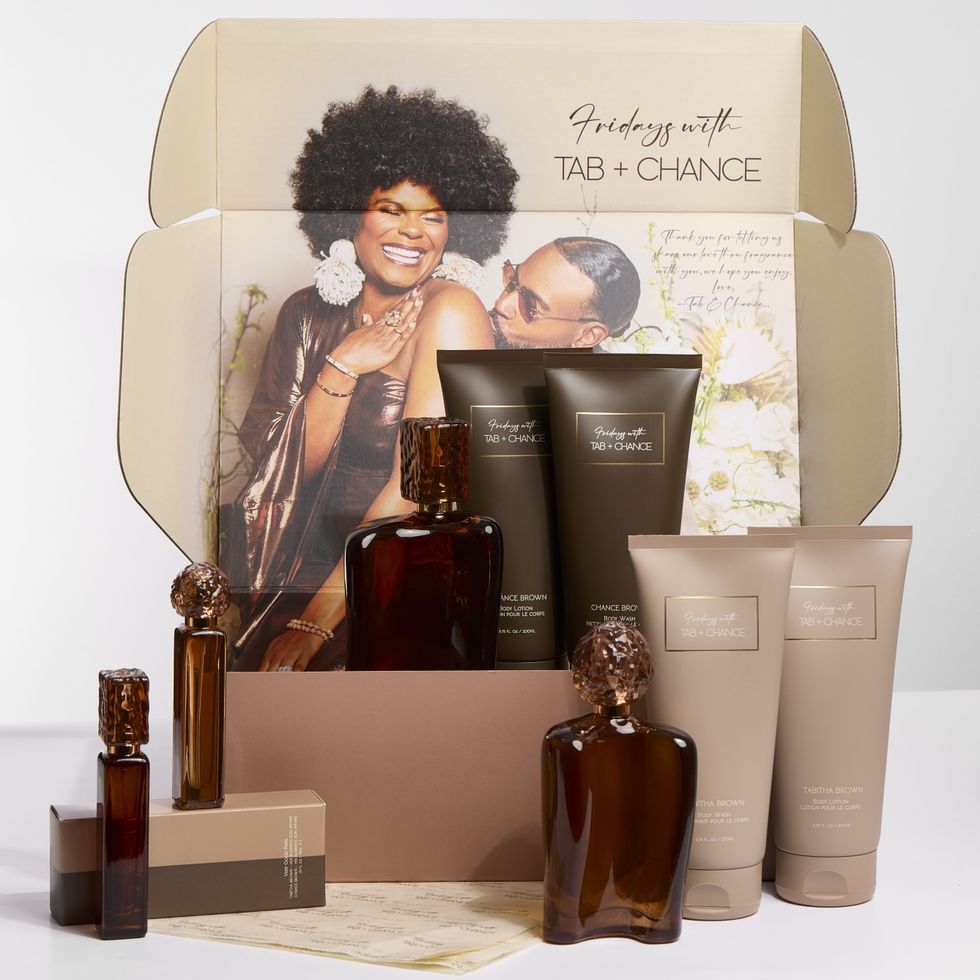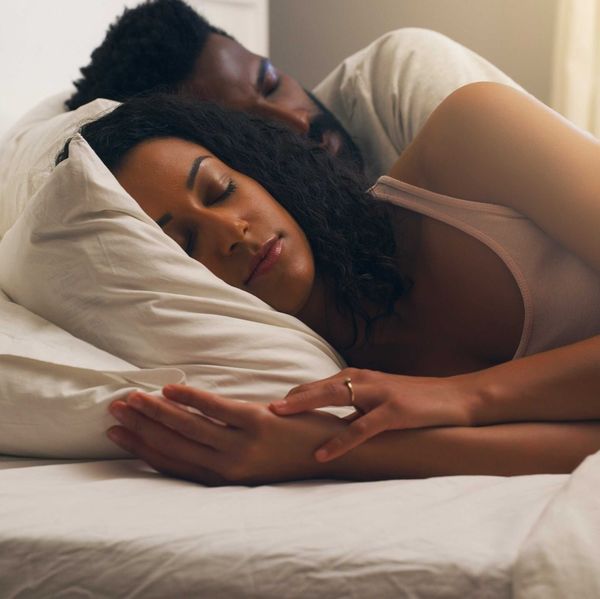
My personal relationship with birth control pills is a bit of an odd one. Back when I first became sexually active (I started having sex with my first boyfriend a couple of months shy of 19), I took them for a couple of months, didn’t like how they made me feel, and so I quit using them altogether (and got pregnant almost immediately after). The rest of my adult life, I stayed off of the pill and pretty much only used condoms (and even then, not consistently — SMDH).
And yet here I am, now, all these years later, back on them again: surprise, surprise.
These days, it's for a completely different purpose, though. Now that I am in the hopefully latter stages of perimenopause (I’m not sure because my mother had a full hysterectomy at 29, her mother died at 53 and I don’t deal with my paternal grandmother because…chile… ) — although I have always had relatively easy cycles and I could definitely set my watch to them, about two years ago, my periods started to show up whenever they felt like it and it was damn near a crime scene once they did.
It was driving me crazy, and so, my nurse practitioner recommended that I take progestin-only pills to shorten, if not completely stop, my cycle: “After a year or so, we can wean off and see if you are entering into menopause on your own.” (Whew, perimenopause, chile.)
Although the first five months of being on this particular pill made me wonder if it was worth it to take this approach, I actually re-upped for another 12-month cycle because the extra progestin (a synthetic form of progesterone) has benefitted me in other areas as well because I am sleeping more soundly and my weight is more stabilized (by the way, when these things are “off,” they are signs of low progesterone levels). However, I did ask my nurse practitioner if, once I do decide to wean off of the pill, would there be any issues.
Her response is what inspired me to write this article because, until she said “post-birth control syndrome” to me, I had no idea there was such a thing. Anyway, if you give me a sec, I’ll explain to you what it is and why you should care if hormone-related birth control is currently a part of your life.
Yes, Post-Birth Control Syndrome Is a Very Real Thing
 Giphy
GiphyOkay, so it’s important to always remember that the way that birth control works is it “manipulates” your hormones so that you can significantly reduce your chances of conceiving. This means that taking them could result in some side effects including nausea; weight gain; headaches; irregular periods and/or spotting; increased stress; depression; blurry vision; breast tenderness, and/or a lowered libido.
That said, even though birth control pills are basically 99 percent effective (when taken correctly and consistently), if the side effects that you are experiencing are making you close to miserable, you should absolutely share that with your healthcare provider because…what’s the sense in preventing pregnancy when you don’t even feel up to having sex because you don’t feel good or your sex drive is shot? More times than not, your provider can find you another pill brand or option that will help you to feel more like yourself.
With that out of the way, think about it — if going on the pill can produce side effects, why would going off of it…not? And this is where post-birth control syndrome comes in.
For the most part, it’s what can happen to your body once you decide to come off of birth control. Typically, the symptoms will last anywhere between 4-6 months and, although the symptoms seem to present themselves most intensely as it relates to going off of the pill, any hormone-related birth control (like IUDs, injections, patches, the ring or implants) could produce similar outcomes.
Outcomes like what?
- Irregular cycles
- Breakouts
- Excessive gas and/or bloating
- Weight gain
- Anxiety and/or depression
- Fertility issues
- Migraines and/or headaches
- Shifts in your libido
- Sleeplessness/restlessness
- Hair loss
Whoa, right? And if a part of you is wondering, “Okay, if this is indeed the case, why have I not heard of this syndrome before?” It’s because it’s not a term that conventional method uses nearly as much as alternative medicine does. Still, it makes all of the sense in the world that if your body has to adjust to an uptick in hormonal intake, it would also need to adjust to removing those extra doses of hormones from your system as well. COMMON. DAMN. SENSE.
Anyway, if you were thinking about taking a break from birth control and taking all of this in has you feeling a bit…let’s go with the word “trepidatious” about doing so, I totally get it. There are some things that you can do to make experiencing post-birth control syndrome either a non-issue or a far more bearable one, though.
7 Home Remedies That Can Make Coping with Post-Birth Control Syndrome Easier
 Giphy
Giphy1. Take a multivitamin. Something that’s fascinating about what going off of birth control can do is it sometimes has the ability to lower your nutrition levels as it relates to certain vitamins and minerals; this is especially the case when it comes to vitamins B, C, E and minerals like magnesium, selenium and zinc. So, if you don’t currently take a multivitamin, now would be the time to start (along with consuming foods that are particularly high in those nutrients as well).
2. Up your vitamin D intake. Speaking of nutrient levels, a vitamin level that commonly drops after going off of birth control is vitamin D. This is hella critical to keep in mind as a Black woman since many of us tend to be naturally deficient in the vitamin as-is and vitamin D is important when it comes to fighting off diseases, regulating weight and keeping your moods stabilized (for starters). So, make sure that your multivitamin has vitamin D in it. Also make sure to consume vitamin D-enriched foods like fatty fish, eggs, mushrooms, yogurt and fortified orange juice.
3. Drink herbal teas. Since going off of birth control will cause your hormones to be all over the place for a season, consider drinking some herbal teas that will help to stabilize them. Black cohosh contains phytoestrogen properties, Chasteberry can help to level out your prolactin levels and green tea can help your hormones out by helping to balance out your insulin (which can sometimes directly affect them).
4. Keep some ibuprofen nearby. The headaches and migraines? Until those subside, you and ibuprofen are probably going to become really good friends; although I will add that ginger tea and inhaling essential oils like chamomile and lavender can help to ease migraine-related symptoms too.
5. Do some meditating. Waiting for your hormones to get back on track can be stressful as all get out. That said, something that can get your cortisol (stress hormone) levels to chill out is to meditate. If meditation is new for you, check out “7 Meditation Hacks (For People Who Can't Seem To Do It).”
6. Get massages. As if you needed an excuse to get a massage, right (check out “12 Different Massage Types. How To Know Which Is Right For You.”)? However, there is some evidence to back the fact that regular massages (somewhere around once a month) can help to lower your stress, boost your dopamine, increase blood flow and drain your lymphatic system so that you will have more energy.
7. Sleep/rest more. There is plenty of scientific research out here which says that sleep deprivation can throw your hormones out of whack — and since your hormones are already trying to stabilize themselves, you definitely need to get 6-8 hours of sleep and not feel the least bit guilty about taking naps sometimes too.
____
Post-birth control syndrome may not be the most pleasant thing about getting off of birth control yet it is manageable. So, now that you know all about it, you can feel more confident about taking a birth control break (or getting off altogether) — without the surprises that can come with doing it. Give thanks.
Let’s make things inbox official! Sign up for the xoNecole newsletter for love, wellness, career, and exclusive content delivered straight to your inbox.
Featured image by Unsplash
Because We Are Still IT, Girl: It Girl 100 Returns
Last year, when our xoNecole team dropped our inaugural It Girl 100 honoree list, the world felt, ahem, a bit brighter.
It was March 2024, and we still had a Black woman as the Vice President of the United States. DEI rollbacks weren’t being tossed around like confetti. And more than 300,000 Black women were still gainfully employed in the workforce.
Though that was just nineteen months ago, things were different. Perhaps the world then felt more receptive to our light as Black women.
At the time, we launched It Girl 100 to spotlight the huge motion we were making as dope, GenZennial Black women leaving our mark on culture. The girls were on the rise, flourishing, drinking their water, minding their business, leading companies, and learning to do it all softly, in rest. We wanted to celebrate that momentum—because we love that for us.
So, we handpicked one hundred It Girls who embody that palpable It Factor moving through us as young Black women, the kind of motion lighting up the world both IRL and across the internet.
It Girl 100 became xoNecole’s most successful program, with the hashtag organically reaching more than forty million impressions on Instagram in just twenty-four hours. Yes, it caught on like wildfire because we celebrated some of the most brilliant and influential GenZennial women of color setting trends and shaping culture. But more than that, it resonated because the women we celebrated felt seen.
Many were already known in their industries for keeping this generation fly and lit, but rarely received recognition or flowers. It Girl 100 became a safe space to be uplifted, and for us as Black women to bask in what felt like an era of our brilliance, beauty, and boundless influence on full display.
And then, almost overnight, it was as if the rug was pulled from under us as Black women, as the It Girls of the world.
Our much-needed, much-deserved season of ease and soft living quickly metamorphosed into a time of self-preservation and survival. Our motion and economic progression seemed strategically slowed, our light under siege.
The air feels heavier now. The headlines colder. Our Black girl magic is being picked apart and politicized for simply existing.
With that climate shift, as we prepare to launch our second annual It Girl 100 honoree list, our team has had to dig deep on the purpose and intention behind this year’s list. Knowing the spirit of It Girl 100 is about motion, sauce, strides, and progression, how do we celebrate amid uncertainty and collective grief when the juice feels like it is being squeezed out of us?
As we wrestled with that question, we were reminded that this tension isn’t new. Black women have always had to find joy in the midst of struggle, to create light even in the darkest corners. We have carried the weight of scrutiny for generations, expected to be strong, to serve, to smile through the sting. But this moment feels different. It feels deeply personal.
We are living at the intersection of liberation and backlash. We are learning to take off our capes, to say no when we are tired, to embrace softness without apology.
And somehow, the world has found new ways to punish us for it.

In lifestyle, women like Kayla Nicole and Ayesha Curry have been ridiculed for daring to choose themselves. Tracee Ellis Ross was labeled bitter for speaking her truth about love. Meghan Markle, still, cannot breathe without critique.
In politics, Kamala Harris, Letitia James, and Jasmine Crockett are dragged through the mud for standing tall in rooms not built for them.
In sports, Angel Reese, Coco Gauff, and Taylor Townsend have been reminded that even excellence will not shield you from racism or judgment.

In business, visionaries like Diarrha N’Diaye-Mbaye and Melissa Butler are fighting to keep their dreams alive in an economy that too often forgets us first.
Even our icons, Beyoncé, Serena, and SZA, have faced criticism simply for evolving beyond the boxes society tried to keep them in.
From everyday women to cultural phenoms, the pattern is the same. Our light is being tested.

And yet, somehow, through it all, we are still showing up as that girl, and that deserves to be celebrated.
Because while the world debates our worth, we keep raising our value. And that proof is all around us.
This year alone, Naomi Osaka returned from motherhood and mental health challenges to reach the semifinals of the US Open. A’ja Wilson claimed another MVP, reminding us that beauty and dominance can coexist. Brandy and Monica are snatching our edges on tour. Kahlana Barfield Brown sold out her new line in the face of a retailer that had been canceled. And Melissa Butler’s company, The Lip Bar, is projecting a forty percent surge in sales.

We are no longer defining strength by how much pain we can endure. We are defining it by the unbreakable light we continue to radiate.
We are the women walking our daily steps and also continuing to run solid businesses. We are growing in love, taking solo trips, laughing until it hurts, raising babies and ideas, drinking our green juice, and praying our peace back into existence.
We are rediscovering the joy of rest and realizing that softness is not weakness, it is strategy.
And through it all, we continue to lift one another. Emma Grede is creating seats at the table. Valeisha Butterfield has started a fund for jobless Black women. Arian Simone is leading in media with fearless conviction. We are pouring into each other in ways the world rarely sees but always feels.

So yes, we are in the midst of societal warfare. Yes, we are being tested. Yes, we are facing economic strain, political targeting, and public scrutiny. But even war cannot dim a light that is divinely ours.
And we are still shining.
And we are still softening.
And we are still creating.
And we are still It.

That is the quiet magic of Black womanhood, our ability to hold both truth and triumph in the same breath, to say yes, and to life’s contradictions.
It is no coincidence that this year, as SheaMoisture embraces the message “Yes, And,” they stand beside us as partners in celebrating this class of It Girls. Because that phrase, those two simple words, capture the very essence of this moment.
Yes, we are tired. And we are still rising.
Yes, we are questioned. And we are the answer.
Yes, we are bruised. And we are still beautiful.

This year’s It Girl 100 is more than a list. It is a love letter to every Black woman who dares to live out loud in a world that would rather she whisper. This year’s class is living proof of “Yes, And,” women who are finding ways to thrive and to heal, to build and to rest, to lead and to love, all at once.
It is proof that our joy is not naive, our success not accidental. It is the reminder that our light has never needed permission.
So without further ado, we celebrate the It Girl 100 Class of 2025–2026.
We celebrate the millions of us who keep doing it with grace, grit, and glory.
Because despite it all, we still shine.
Because we are still her.
Because we are still IT, girl.
Meet all 100 women shaping culture in the It Girl 100 Class of 2025. View the complete list of honorees here.
Featured image by xoStaff
'You Both Are Going To Change': Tabitha & Chance Brown On Their New Body Collection & Successful Partnership
Tabitha and Chance Brown are the epitome of Black love. They've been married for 22 years after first meeting in middle school and share a beautiful blended family. The beloved couple is no stranger to talking about their journey to the altar and the ups and downs they've faced together on their show, Fridays with Tab & Chance. Now, they have taken the name Fridays and expanded it into a body collection.
The new collection, which dropped on November 14, features a body wash and a body lotion that complement their fragrances, Her Business and His Business. "We had such a huge success with the fragrance launch, and it’s because of our customers and fans," Tabitha shares in an exclusive interview with xoNecole.
"They asked for body products and we wanted to make sure we listened. But also layering fragrance begins with the body routine." The body wash is $33, and the body lotion is $35. Keep reading below to hear more about Tabitha and Chance's new collection, their body rituals, and what makes their partnership successful.

Fridays with Tab and Chance body collection
Marcus Owens
xoNecole: How did you come up with the scents for the collection?
Tabitha Brown: We love warm scents that make you feel sexy and loved. [We’re] both fans of gourmand [scents], including bergamot, vanilla, tonka and chocolate.
xoN: If you could describe your working relationship in one word, what would it be and why?
Tabitha: It's our first time building a product line together and our first time working with fragrance. So having patience with the process and each other has been the best way to build.
xoN: What is your body care ritual?
Tabitha: Exfoliate with a scrub a few times a week, but using a moisturizing body wash daily. After a shower, I spray a body mist that compliments what scent I am choosing for the day. Most times vanilla mist wins because it’s a perfect base for layering. I then hydrate [my] skin with lotion. Then, once dressed, I layer my favorite fragrance, Her Business, first and then His Business on top.
Chance: [I’m] way more simple. Just body wash and lotion and then my cologne and I’m good to go.
xoN: We enjoy watching you two together online, whose idea was it to start 'Fridays with Tab & Chance'?
Tabitha: It actually happened by accident. Back in 2018, my fans had just been asking about how we met, so we did a video answering questions one Friday and people in the comments [asked], will y’all do it again next Friday? And so we did and the next thing you know Fridays with Tab & Chance was born.
xoN: In what other ways do you plan to expand Fridays? Restart the podcast? TV show?
Tabitha: We are working on a lifestyle content show vs the traditional Fridays podcast. More to come soon.
xoN: You do many things together, but what would you say is your favorite quality time activity and why?
Tabitha: We are really simple. We love watching movies or TV series together on the couch or in bed. It’s really one of our favorite things to do together.
xoN: What is your favorite thing about the other person?
Tabitha: I love that he makes me feel safe and how hard he works to be an amazing father.
Chance: I love that she is crazy enough to pursue her wildest dreams.
xoN: What is the key to a successful partnership in business and personal?
Tabitha: The key is knowing that you both are going to change, and giving each other grace, patience, and understanding during those changes.
See more on tabandchance.com.
Feature image Marcus Owens









